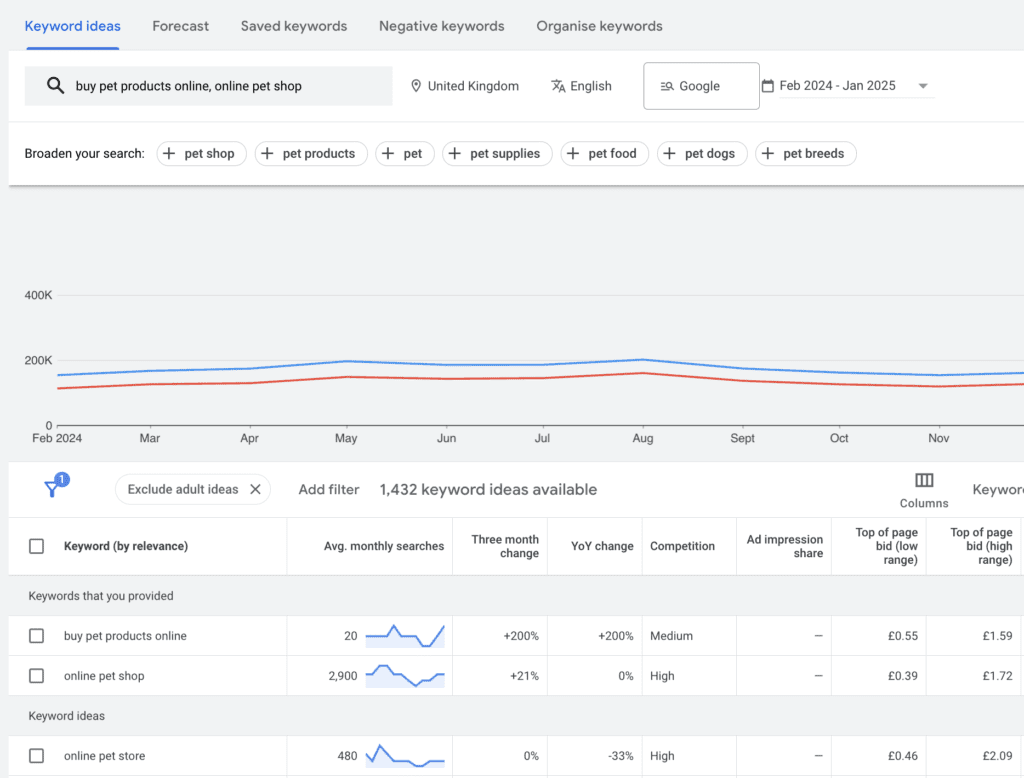If you’re here, you are probably looking for some quick and practical SEO keyword optimisation tips to help improve your organic rankings and traffic.

SEO keyword optimisation isn’t as simple as you might think – the trick is to make your content easy for search engines to find and understand.
The good news is that we have produced a series of in-depth guides already. For a simple but comprehensive overview of SEO, check out below:
SEO Basics: The Simple SEO Guide for Website Owners [UPDATED]
For the complete lowdown on keyword research, analysis and planning, be sure to read our guides below.
Want to take your SEO even further? Check out our in-depth guides below for advanced keyword research, analysis, and planning. But if you’re short on time, just start by applying the five tips in this guide, and you’ll be on the right track.
SEO Keyword Analysis & Planning: How to Choose the Best Keywords For Your Website [UPDATED]
Editor’s Note [01.03.25]: This article was actually produced back in 2011, so we’ve decided to give it a 2025 refresh to bring it up to date. While the core principles of SEO remain the same, Google’s algorithms and best practices have changed significantly. In this updated version, we’ve fine-tuned the advice to reflect modern strategies, ensuring that your SEO keyword optimisation efforts are both effective and aligned with today’s guidelines and best practices.
Ok, let’s get stuck in.
SEO keyword optimisation fundamentals
- 1 SEO keyword optimisation fundamentals
-
2
Our top 5 keyword optimisation tips
- 2.1 Tip#1 – Find the right keywords
- 2.2 Tip#2 – Prioritise your keyword in the meta title tag (but naturally)
- 2.3 Tip#3 – Forget keyword density, focus on natural language
- 2.4 Tip#4 – Keywords in domain names? Not a big deal anymore
- 2.5 Tip#5 – Keep keywords at the back of your mind, but focus on creating valuable content
- 3 Final thoughts: SEO success is about more than just keywords
- 4 Getting support with your SEO
The two critical factors you should consider when carrying out keyword optimisation are:
- Finding the right keywords to attract high-quality traffic.
- Understanding where and how to add your keywords.
Expanding on this further, here are 5 practical tips to help you excel in your SEO and keyword optimisation endeavours.

Keyword optimisation fundamentals
Our top 5 keyword optimisation tips
Tip#1 – Find the right keywords
Before you even think about where to place your keywords, you need to make sure you’re targeting the right ones.
It’s not just about high search volume anymore. It’s about relevance, search intent, and competition matter just as much.
Here’s how to find the best SEO keywords for your content:
- Think like your audience – What would someone actually type into Google to find what you’re offering? Consider questions, problems, and conversational phrases.
- Use keyword research tools – Free tools like Google Keyword Planner or AnswerThePublic can help you spot trending and find long-tail keywords.
- Check the competition – Search your target keywords and see what kind of content is already ranking to get ideas. Can you offer a better, more helpful version?
- Look at search intent – Are people looking for information, a product, or a service? Matching your keywords and content to the right search intent will help to ensure you attract the right visitors and keep them engaged.
For more advice, we’ve provided some excellent information below.
Finding the right keywords isn’t about stuffing your page with your chosen keywords, it’s about understanding what your audience needs and giving them the best possible content.
Tip#2 – Prioritise your keyword in the meta title tag (but naturally)
When you put the wheels in motion for your search engine optimisation, one fundamental factor that you should always keep in mind is the physical placement of keywords.
One of the most important places to add these is the meta title tag (or page title).
This is an old example from our site showing a meta title tag.
The old advice was to place your primary keyword near the beginning of the title tag, but forcing it unnaturally isn’t necessary.
Meta tags should be compelling for readers, not just search engines. Google values clarity and relevance over rigid keyword placement. You also want your meta tags to catch the eye of people browsing search results and compel them to click through to your site.
If we revisit our example above, we might take a view today that this could be improved by adding some engagement-focused language and CTAs to make it more compelling.
For example:
<title>Ultimate Guide to Keyword Research for SEO | Start Ranking Higher Today</title>
However, in both examples, the target keyword “Keyword Research for SEO” is positioned prominently but naturally.
By implementing this single tip across your pages, you are guaranteed to improve your chances of being found for that keyword.
Tip#3 – Forget keyword density, focus on natural language
When you are planning your SEO, more does not necessarily mean better.
Our advice back in 2011 was to pay attention to keyword density, with a general rule of thumb being to have somewhere in the range of 2-5%.
Over the following years, this range came down to as low as 0.5-2% depending on the topic and the average keyword densities being used by competitors.
However, keyword density is not a ranking factor, and these days, our advice is to not think in terms of densities or percentages.
Instead, prioritise natural readability over specific percentages and think about semantic variations, related terms (LSI), and contextually relevant phrases.
Tip#4 – Keywords in domain names? Not a big deal anymore
Again, back in 2011, one of the best tips for ranking high in search engines was to purchase a domain name using the exact SEO keyword or phrase.
You will still find many domains that used this tactic ranking well in Google, but exact-match domains (EMDs) have lost their ranking advantage for those considering modern SEO.

Your domain name is important to direct traffic but also says a lot about your business.
Instead, focus on branding and relevance. A domain like “BestSEOBirmingham.co.uk” won’t rank higher just because it has an exact match on the keywords.
If you want to make an impact by placing keywords correctly, revisit Tip#2 or read our final tip below.
Tip#5 – Keep keywords at the back of your mind, but focus on creating valuable content
When we first published this guide, we had two tips titled “keyword phrase order” and “keyword competition”. These have now been replaced by this final tip.
However, it’s still worth considering keyword search volumes and competition when selecting and using keywords, as there’s little point in carrying out keyword optimisation where there are thousands or maybe even millions of other authoritative websites competing for the same traffic.
As a general rule, avoid single-word keywords, such as ‘Restaurants’, ‘Flowers’ or ‘SEO’ and go back to the advice about choosing less competitive long-tail keywords.

Analyse keywords by search volume and competition
Now, the real tip here is to prioritise valuable, people-first content while using keywords naturally.
Rather than obsessing over exact keyword placement or densities, focus on answering real questions, solving problems, and providing genuinely useful information.
Google’s algorithms understand intent. This means well-written, relevant content will naturally rank better than something stuffed with keywords in an attempt to game the system.
Use your selected keywords as a guide, not a rulebook. Keep them in the back of your mind, but write in a way that feels natural, and ensure your content reads well for humans first and search engines second.
Why Good Content Matters: SEO Content Creation Guidelines [UPDATED]
Final thoughts: SEO success is about more than just keywords
SEO has come a long way since 2011.
While keyword optimisation is still important, it’s no longer about tactically adding words and phrases to your content or following rigid formulas. Instead, Google rewards high-quality, valuable content that genuinely helps users.
If there’s one takeaway from this guide, it’s this: use keywords strategically, but don’t let them dictate how you write.
Prioritise clarity, engagement, and user intent, and search engines will follow.
Getting support with your SEO
For those just getting started with building an online presence, SEO can be difficult to understand and implement. Keyword optimisation is an important aspect of SEO, but not the only aspect, and there’s lots more to consider.
Thankfully, we have lots of useful guides and information to help you master SEO, including below, which provides further quick wins, tips, and techniques:
If you need hands-on support, it’s important to find a reputable SEO agency. Do your research and find one with a proven track record in consistently delivering improvements for customers. Look at their reviews and read their blog posts to see whether their advice is up-to-date and easy to understand.
Do you have any tips on SEO keyword optimisation or advice that we’ve not covered here? Please share your comments with us below or on social media.






0 Comments